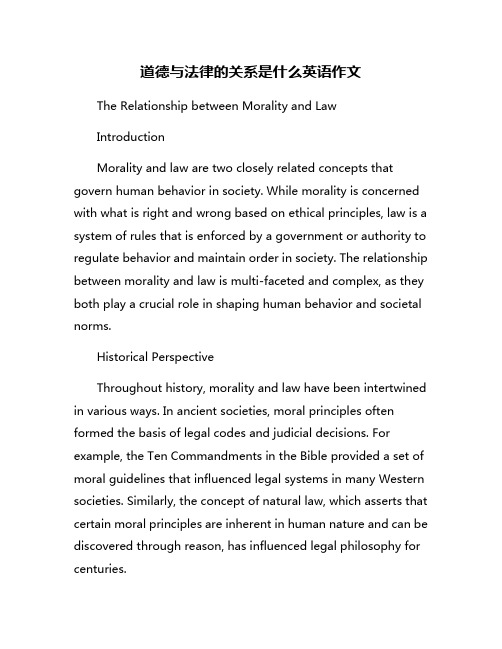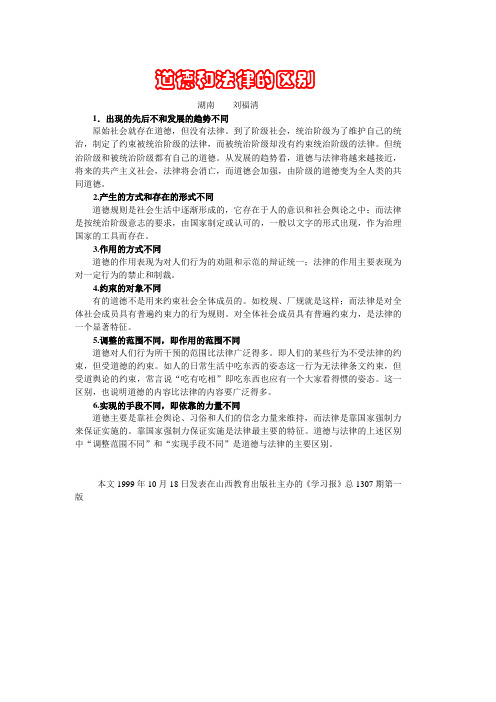道德与法律的不同The Differences between Morality and Law
法律与道德有哪些不同

法律与道德有哪些不同【摘要】法律与道德是相互区别的,不能相互替代、混为一谈,也不可偏废,所以单一的法治模式或单一的德治模式不免有缺陷;同时,法律与道德又是相互联系的,在功能上是互补的,都是社会调控的重要手段,这就使得德法并治模式有了可能。
法是按照特定的程序制定的,主要表现为有关国家机关制定的各种规范性文件,或者是特殊判例;而道德通常是潜移默化的。
法必然要经历一个从产生到消亡的过程,它最终将被道德所取代,人们将凭借自我道德观念来实施自我行为。
一、道德与法律的学理含义:(一)道德的含义:从唯物史观的角度来看,道德根源于一定的物质生活条件。
恩格斯讲:“一切以往的道德论归根到底都是当时的社会经济状况的产物。
而社会直到现在还是在阶级对立中运动的,所以道德始终是阶级的道德。
”这表明道德的内容最终由经济条件决定,并伴随经济的发展而有相应的变化;基于不同的物质生活条件的不同社会集团,有着不同的道德观,在阶级社会中的道德具有阶级性。
因此,我们可以把道德简单的概括为:道德是生活在一定物质生活条件下的自然人关于善与恶、光荣与耻辱、正义与非正义、公正与偏见、野蛮与谦逊等观念、原则以及规范的总合,或者说是一个综合的矛盾统一体系。
(二)与道德密切相关的法律的含义。
没有亘古不变的永恒道德,也没有亘古不变的永恒法律。
今天的社会,代表不同利益的统治集团仍然还存在,但是他们代表的阶级利益是根本不同或者是对立的。
不同的统治集团各有各自的阶级利益,以及与其阶级利益相适应的道德。
法律在本质上是统治集团的整体意志上升为国家意志,既然法律是意志的具体化,而道德当然属于意志范畴,那么法律当然反映统治阶级的道德观。
从侧重道德的角度,我们可以将法律定义为:在主观方面,法是国家意志和统治阶级意志的体现;在客观方面,法的内容由一定的社会物质生活条件所决定。
前者体现了法的国家意志性和统治阶级意志,后者体现了法的物质制约性。
法就是这两个方面的矛盾统一体。
道德与法律的关系是什么英语作文

道德与法律的关系是什么英语作文The Relationship between Morality and LawIntroductionMorality and law are two closely related concepts that govern human behavior in society. While morality is concerned with what is right and wrong based on ethical principles, law is a system of rules that is enforced by a government or authority to regulate behavior and maintain order in society. The relationship between morality and law is multi-faceted and complex, as they both play a crucial role in shaping human behavior and societal norms.Historical PerspectiveThroughout history, morality and law have been intertwined in various ways. In ancient societies, moral principles often formed the basis of legal codes and judicial decisions. For example, the Ten Commandments in the Bible provided a set of moral guidelines that influenced legal systems in many Western societies. Similarly, the concept of natural law, which asserts that certain moral principles are inherent in human nature and can be discovered through reason, has influenced legal philosophy for centuries.However, as societies have evolved and become more complex, the relationship between morality and law has become increasingly nuanced. While some laws are based on moral principles, others may conflict with individual or societal values. For example, laws that prohibit same-sex marriage or abortion may be perceived as moral issues by some people, while others may view them as unjust restrictions on personal freedom.Role of GovernmentOne of the primary functions of government is to create and enforce laws that reflect the moral values and priorities of society. In a democracy, laws are generally based on the values and beliefs of the majority, which are often rooted in moral principles. For example, laws against murder, theft, and other crimes are based on the moral imperative to protect human life and property.However, governments are also responsible for balancing competing values and interests when creating laws. In some cases, laws may be passed that are perceived as morally questionable or unjust by certain individuals or groups. For example, laws that restrict freedom of speech or assembly may be justified on grounds of public safety or national security, butmay conflict with principles of free expression and individual liberties.Legal vs. Moral ObligationsWhile laws are binding on all members of society and are enforced through legal sanctions, moral obligations are more subjective and may vary depending on individual beliefs and values. In some cases, individuals may be faced with a conflict between legal and moral obligations, such as in cases of civil disobedience or conscientious objection. For example, individuals may choose to violate a law that they perceive as unjust or immoral in order to uphold their own ethical principles.In other cases, laws may be used to enforce moral standards that are not universally accepted by all members of society. For example, laws that criminalize drug use or gambling may be based on moral considerations, but may also be seen as intrusions on personal freedom and autonomy. In such cases, individuals may be compelled to follow the law even if they disagree with its moral implications.ConclusionThe relationship between morality and law is a complex and dynamic one that continues to evolve as society changes andvalues evolve. While morality and law are both essential for maintaining order and promoting the common good, they are not always in perfect alignment. It is important for individuals to critically examine the laws that govern their lives and to consider the moral implications of their actions in order to create a more just and ethical society. Ultimately, the relationship between morality and law is a reflection of the complex interplay between individual values, societal norms, and governmental authority.。
法律区别于道德规范

法律区别于道德规范
1、在形成上不同。
道德是在社会生活中逐渐形成的,它存在于人们的意识和舆论中。
这是自发的。
法律是国家根据统治阶级的意志批准的。
也就是说,它有类。
2、在实施手段上不同。
道德主要靠社会舆论、习俗和人们的信念的力量来维护。
即具有理念性。
法律靠国家强制力保证实施,即具有强制性。
3、在约束力上不同。
阶段社会的道德规则,不能约束每一个社会成员,而法律对全体社会成员具有普遍的约束力。
4、产生的条件不同。
原始社会没有现代意义上的法律,只有道德规范或宗教禁忌,或者说氏族习惯。
法律是在原始社会末期,随着氏族制度的解体以及私有制、阶级的出现,与国家同时产生的。
而道德的产生则与人类社会的形成同步,道德是维系一个社会的最基本的规范体系,没有道德规范,整个社会就会分崩离析。
法律区别于道德规范、宗教规范、风俗习惯等其他社会规范的首要之处在于()
A.法律是由国家创制并保证实施的社会规范
B.法律是统治阶级意志的体现
C.法律由社会物质生活条件决定
D.法律具有明确性与权威性。
法律与道德的关系英语作文

法律与道德的关系英语作文Title: The Relationship between Law and MoralityThe relationship between law and morality has been a topic of extensive debate among scholars and philosophers for centuries.While some argue that the two concepts are closely intertwined, others contend that they are distinct and independent of each other.This essay aims to explore the intricate relationship between law and morality and highlight their respective roles in society.Law can be defined as a set of rules and regulations established by a governing authority to maintain order and enforce order in a society.It serves as a framework for governing the behavior of individuals and provides a mechanism for resolving disputes.On the other hand, morality refers to a set of principles or values that guide individual behavior and judgment.It is often influenced by cultural, religious, or personal beliefs and shapes our decisions and actions.The relationship between law and morality can be examined from various perspectives.One perspective is that law and morality are interconnected and should not be separated.According to this view, the law reflects the moral values of society and serves as a means to enforce these values.For instance, laws against theft and murder reflect the moral belief that individuals have a right to property and life.In this sense, the law and morality work hand in hand to promote a just and moral society.However, there are instances where the law and morality may conflict with each other.For example, during the era of apartheid in South Africa, laws were enacted that enforced racial segregation and discrimination.From a moral standpoint, these laws were considered unjust and violated the principles of equality and human rights.In such cases, individuals may face a moral dilemma, as they are torn between obeying the law and violating their moral principles.Another perspective is that law and morality are distinct and independent of each other.According to this view, the law is a set of rules established by the state, while morality is a personal belief or value.While the law may influence individual behavior, it does not necessarily reflect an individual"s moral values.This perspective suggests that individuals should follow the law, not because it is morally right, but because it is legally binding.In conclusion, the relationship between law and morality is complex and multifaceted.They are interconnected in many ways, as the law often reflects the moral values of society.However, there are instances where the law and morality may conflict, leading to moral dilemmas.Ultimately, individuals must navigate the intricate relationship between law and morality and make informed decisions that align with their personal values and principles.。
法与道德有何联系和区别

法与道德有何联系和区别?
法与道德属于上层建筑 SUPERSTRUCTURE的不同范畴。
法律属于制度的范畴;而道德则属于社会意识形态的范畴。
法律规范的内容主要是权利与义务,强调两者的衡态;道德强调对他人、对社会集体履行义务,承担责任。
法律规范的结构是假定、处理和制裁或者说是行为模式和法律后果;而道德规范并没有具体的制裁措施或者法律后果。
法由国家的强制力保证实施;而道德主要凭借社会舆论、人们的内心观念、宣传教育以及公共谴责等诸手段。
法是按照特定的程序制定的,主要表现为有关国家机关制定的各种规范性文件,或者是特殊判例;而道德通常是潜移默化的。
法必然要经历一个从产生到消亡的过程,它最终将被道德所取代,人们将凭借自我道德观念来实施自我行为。
经济法调整对象应是由市场失灵所产生的经济关系、宏观调控关系及市场管理关系。
这是因为经济法的立足点是市场失灵,经济法的产生源于对市场失灵规制的需要,经济法的发展与不断完善源于对市场失灵与政府失灵认识的不断深化。
30.答案:经济法律关系须由此三个要素构成。
(1)经济法律关系必须首先有参加者(主体);(2)参加者根据经济法律、法规,确定彼此享受哪些权利,承担哪些义务,此即经济法律关系的内容;(3)参加者通过设定权利义务所要获得的财物,所要实现的行为,即为经济法律关系的客体。
经济法律关系三要素是构成经济关系最基本、最必需的要素。
论道德与法律的区别与联系

论道德与法律的区别与联系第一篇:论道德与法律的区别与联系道德与法律的区别与联系古人云:“君子爱财取之有道”。
孔子的《论语》为我们今天的道德更是贡献不少······这些都诠释了道德与法律是一对孪生兄弟,也诠释了道德与法律既有区别也有联系。
常言道:“以德服人,以法治国。
”道德是建立在一定社会经济上的思想关系,是一种特殊的社会意识形态或上层建筑,道德是以善恶为标准,调节人们之间和个人之间与社会之间关系的行为规范。
法律属于上层建筑范畴决定与经济基础,并为经济基础服务。
法律就是国家按照统治阶级的利益和意志制定和认可的并由国家强制执行的行为规范总和。
道德与法律的关系是大家热议的话题,对二者的关系说法很多,其次之间既有联系又有区别的。
道德与法律的区别:法律和道德是两种不同行为规范,他们的产生原因,调整对象、调整范围、表现形式、调整机制、评价标准等方面各有不同。
第一、法律与道德产生的条件与消亡各不相同。
根据马克思主义关于国家与法的说法,国家是阶级矛盾不可调和的产物。
因此,法律的产生以国家强制力为后盾的行为规范。
没有国家就没有法律,国家的性质决定法律的性质。
而道德则不以国家的产生为前提,早在原始社会就已经有了道德的存在。
在一种社会形态之内,通常只能存在一种同一性质的法律。
却可能存在几种不同性质的道德。
如在社会主义国家以前,少数先进人物与革命导师就已经具备了社会主义的道德和道德的品质。
法律既然随着国家的产生而产生。
也必然随着国家的消亡而消亡。
但是,在法律消亡之后,道德依然存在。
第二、法律和道德调整的对象范围有所不同。
在现代国家法律调整的对象仅限于人们的外在行为,单纯的思想或动机不是法律所调整的对象在古代社会曾经有过“腹诽”、“莫须有”等以思想定罪的荒谬案件这种情形与现代的法治原则是格格不入的。
而道德所调整的范围也比法律要广泛。
例如婚姻关系是法律与道德共同调整的对象,但是爱情关系、友谊关系通常只受道德的调整不不受法律的调整。
道德和法律的区别

道德和法律的区别湖南刘福清1.出现的先后不和发展的趋势不同原始社会就存在道德,但没有法律。
到了阶级社会,统治阶级为了维护自己的统治,制定了约束被统治阶级的法律,而被统治阶级却没有约束统治阶级的法律。
但统治阶级和被统治阶级都有自己的道德。
从发展的趋势看,道德与法律将越来越接近,将来的共产主义社会,法律将会消亡,而道德会加强,由阶级的道德变为全人类的共同道德。
2.产生的方式和存在的形式不同道德规则是社会生活中逐渐形成的,它存在于人的意识和社会舆论之中;而法律是按统治阶级意志的要求,由国家制定或认可的,一般以文字的形式出现,作为治理国家的工具而存在。
3.作用的方式不同道德的作用表现为对人们行为的劝阻和示范的辩证统一;法律的作用主要表现为对一定行为的禁止和制裁。
4.约束的对象不同有的道德不是用来约束社会全体成员的。
如校规、厂规就是这样;而法律是对全体社会成员具有普遍约束力的行为规则。
对全体社会成员具有普遍约束力,是法律的一个显著特征。
5.调整的范围不同,即作用的范围不同道德对人们行为所干预的范围比法律广泛得多。
即人们的某些行为不受法律的约束,但受道德的约束。
如人的日常生活中吃东西的姿态这一行为无法律条文约束,但受道舆论的约束,常言说“吃有吃相”即吃东西也应有一个大家看得惯的姿态。
这一区别,也说明道德的内容比法律的内容要广泛得多。
6.实现的手段不同,即依靠的力量不同道德主要是靠社会舆论、习俗和人们的信念力量来维持,而法律是靠国家强制力来保证实施的。
靠国家强制力保证实施是法律最主要的特征。
道德与法律的上述区别中“调整范围不同”和“实现手段不同”是道德与法律的主要区别。
本文1999年10月18日发表在山西教育出版社主办的《学习报》总1307期第一版。
法律与道德的区别与联系

法律与道德的区别与联系什么是法律?法律是社会规则的一种,通常指:由国家制定或认可,并由国家强制力(即军队、警察、法庭、监狱等)保证实施的,以规定当事人权利和义务为内容的,具有普遍约束力的一种特殊行为规范(社会规范)。
法律是维护人民权利的工具,需要经由一套制度来落实。
但在不同的地方,法律体系会以不同的方式来阐述人们的法律权利与义务。
其中一种区分的方式便是分为欧陆法系和英美法系两种。
有些国家则会以他们的宗教法条为其法律的基础。
法律的研究来自于对何为平等、公正和正义等问题的讯问;学者们从许多不同的角度来研究法律,包括从法制史和哲学,或从如经济学与社会学等社会科学的方面来探讨。
今天,法律以各种方式影响着每个人的日常生活与整个社会。
什么是道德“道”是万物万法之源,创造一切的力量;德是为顺应自然、社会和人类客观需要去做事的行为,不违背自然发展规律,去发展自然、发展社会,提升自己的践行方式。
道是在承载一切;德是在昭示道的一切。
大道无言无形、看不见听不到摸不着,只有通过我们的思维意识去认识和感知它;而德是道的具体实例,也是道的体现,我们能看到的心行,我们通过感知后所进行的行为。
如果没有德,我们就不能如此形象地了解道的理念,这就是德与道的关系。
道德是一种社会意识形态,它是人们共同生活及其行为的准则与规范。
罪莫大于无道,怨莫大于无德。
道德与法律的区别与联系法律与道德的区别:1.产生的条件不同。
原始社会没有现代意义上的法律,只有道德规范或宗教禁忌,或者说氏族习惯。
法律是在原始社会末期,随着氏族制度的解体以及私有制、阶级的出现,与国家同时产生的。
而道德的产生则与人类社会的形成同步,道德是维系一个社会的最基本的规范体系,没有道德规范,整个社会就会分崩离析。
2.表示形式不同。
法律是国家制定或认可的一种行为规范,它具有明确的内容,通常要以各种法律渊源的形式表达出来,如国家制定法,习惯法,判列法等。
而道德规范的内容存在于人们的意识之中,并通过人们的言行表现出来3.调整范围不尽相同。
- 1、下载文档前请自行甄别文档内容的完整性,平台不提供额外的编辑、内容补充、找答案等附加服务。
- 2、"仅部分预览"的文档,不可在线预览部分如存在完整性等问题,可反馈申请退款(可完整预览的文档不适用该条件!)。
- 3、如文档侵犯您的权益,请联系客服反馈,我们会尽快为您处理(人工客服工作时间:9:00-18:30)。
Their is implemented by national force. • Morality is mainly maintained by public opinion and people's self-discipline.
• The religion has social organizations legally established and carry out the normative religious activities, which are supported by government. • Superstition often becomes frauds to deceive public and earn money.
The Differences between Morality and Law
Morality and law are main social norms, existing in two kinds of forms.They have distinctions and connections.
Their manifestations are different
• The law is made by legislature, represented by specific contents. • The morality lies in consciousness of people, represented by behaviour of people.
The Differences between Religion and Superstition
Religion and superstition are based on theism, trusting and admiring God or supernatural power. This is What they have in common.
• The religion is a cultural phenomenon. Religion in the process of its formation and development constantly absorbed the human' ideology and culture, and politics, philosophy, law, culture, including literature, poetry, painting, sculpture, architecture, art, music, moral consciousness in the form of mutual penetration and mutual tolerance, to be the world's rich cultural elements. • Superstition does not have these features.
• Religion is a kind of social ideology, having the objective rules of its occurrence, development and extinction. There are strict religious organizations, activity sites and system. • Superstition has neither common sites, rituals, nor idols.
Conditions of their formation are different
• There is no real law in primitive society, only morality and religious w came into being in the late primitive soceity, along with the collapse of the clan system and the emergence of private ownership, class, and the country at the same time. • The generation of moral is synchronous with the formation of human society.
